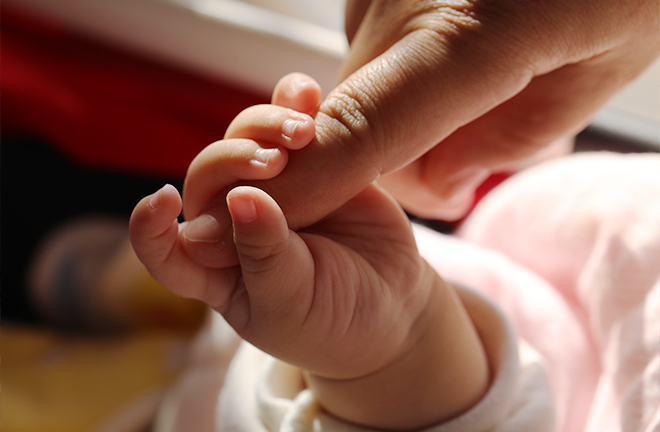Toward birth-friendly society: A holistic approach

A birth-friendly society must encompass the entire process of marriage, pregnancy, childbirth, and parenting, addressing the needs of all demographic groups while adopting a holistic perspective. Photo: IC PHOTO
In recent years, many countries and regions face the dual pressure of declining birth rates and population aging. China is no exception, with these issues posing grim challenges to the nation’s economic and social development. It has therefore become imperative to refine population development strategies, build a birth-friendly society, and bring down the costs of childbirth, parenting, and education, to promote high-quality demographic development.
In his work Reproductive System, renowned Chinese sociologist Fei Xiaotong noted that childbearing entails significant sacrifices for women, including the discomfort of pregnancy, the risks of labor, and the challenges of breastfeeding. He argued that if society does not assume full responsibility for reproduction, the integrity of social structures cannot be guaranteed.
While this perspective was rooted in the era of small-scale farming, it is even more pertinent in today’s information age, when childbirth must be treated as a comprehensive societal responsibility. Building a birth-friendly society requires providing full life-cycle services that cater to all demographic groups, as well as improving and implementing supportive policies for reproduction. This includes fostering a cultural environment, incentive mechanisms, service systems, and market conditions conducive to marriage and childbearing. Such efforts aim to create a virtuous cycle where people are willing to marry and have children, are able to afford these endeavors, and can raise healthy, well-educated children. These measures are essential to maintaining a moderate fertility rate and a stable population size.
Features of birth-friendly society
A birth-friendly society emphasizes the entire process of marriage, pregnancy, childbirth, and childcare, with a focus on the labor life cycle of caregivers, primarily women. It seeks to ensure that women can achieve self-fulfillment in both public and private spheres. As demographic capital continues to improve, workplace gender discrimination and unequal treatment have intensified the tension between women’s career and their reproductive roles. The rising economic, time, and opportunity costs associated with marriage, childbirth, parenting, and education have deterred many families from having a second child—or even a first. The overlap between the prime years for childrearing and career development has created a “motherhood-career” dual penalty, which limits fertility while hindering women’s professional growth.
A birth-friendly society also aims to address the burdens of childcare by reducing the costs of marriage, childbirth, and parenting through comprehensive public services and social support. These efforts help to alleviate the anxiety and hesitation surrounding marriage and childrearing. Currently, the limited coverage of reimbursements for childbirth-related medical expenses, the high cost of assisted reproductive technologies, and challenges in inclusive childcare services—such as structural imbalances, low quality, and a lack of trust—exacerbate the problem. Additionally, the steep costs of education, healthcare, and housing directly impact family fertility decisions, while also indirectly diminishing reproductive intentions by affecting child-bearers’ mental health and quality of life, intensifying “rat race” societal competition.
A birth-friendly society further underscores the economic and cultural significance of marriage and childbearing. It promotes a compatible and inclusive environment that fosters respect for marriage, reproduction, and family life. Such a society can inspire young people to develop positive perspectives on marriage, relationships, reproduction, and family. It cultivates an ethos that encourages marriage and childbearing at the right time, moderate fertility levels, shared responsibilities between couples, and joint support from families and the nation. This vision also celebrates love, happiness in marriage, warm family bonds, and fulfilling lives. Women, central to reproduction, can receive respect and support from both their families and society.
Moreover, a birth-friendly society values autonomy in marriage and childbearing, creating an environment that allows reproductive choices to be made freely. It respects and supports diverse family decisions, fostering an inclusive, caring, and supportive atmosphere for families that wish to marry and have more children. At the same time, it works to reduce biases against alternative lifestyles, such as singlehood or DINK (Dual Income, No Kids), respecting everyone’s individual choices regarding marriage and reproduction.
Therefore, a birth-friendly society must encompass the entire process of marriage, pregnancy, childbirth, and parenting, addressing the needs of all demographic groups while adopting a holistic perspective. It should foster an environment that is inclusive and supportive of men and women, children, expectant mothers, parents, and the elderly; of marriage, pregnancy and childbirth, parenthood, and families; and of economic, temporal, service, workplace, and cultural considerations.
Policy recommendations
To establish such a society, it is crucial to address current policy gaps and enhance the effectiveness of existing measures by considering the full life cycle, the needs of all demographic groups, and holistic support for marriage and reproduction. Building a robust policy framework, establishing a well-functioning service system, and cultivating a supportive social environment are key to encouraging individuals to marry and have children, ensuring high reproductive quality, and enabling families to afford childrearing while fostering the healthy development of future generations. Specific measures include improving the fertility subsidy system to provide greater financial support; innovating service methods and models; promoting awareness of the social and cultural benefits of marriage and childbirth; facilitating the high-quality, full employment of caregivers, particularly women; and strengthening the evaluation of existing support policies and services for marriage and childbirth to maximize their effectiveness.
Yang Juhua is a professor from the Research Center for Population and Ethnic Development at Minzu University of China.
Edited by CHEN MIRONG
